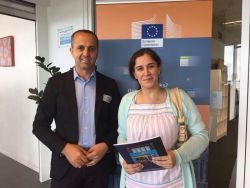June 2017
Diyanet wins the church lottery from Mardin

After Mardin became a Metropolitan Municipality, its villages were officially turned into neighbourhoods and attached to the provincial administration. Following this legislative amendment the Governorate of Mardin established a liquidation committee. The Transfer, Liquidation and Redistribution Committee of the Mardin Governorate transferred numerous property of Syriacs such as churches, monasteries and cemeteries, to public institutions. The Mor Gabriel Monastery Foundation appealed to the decision yet the liquidation committee rejected their appeal. The property placed at the disposal of the Treasury was then transferred to the Presidency for Religious Affairs (Diyanet).
ESU presents Turkey Country Report to European authorities in the Commission

A delegation from the European Syriac Union presents its “Annual Report on the Situation of Syriacs in Turkey” to the European authorities in the Commission
As an international civil society organization ESU works in different fields and with various actors to bring more attention to the cause of the Syriac (Chaldean-Aramaic-Assyrian) people in their homeland and in the diaspora.
The delegation consisted of ESU Co-Chair Tony Vergili and Foreign Affairs representative Jacques Eliazar. They met with European Commission officials from the Turkey desk while presenting the report and discussing the situation of the Syriac people of the past year and recent social and political process in the country. After the failed 2016 coup attempt, Turkey, under the leadership of Recep Tayyip Erdogan and the AKP, entered into a new process with a bold discourse of nationalism, Islamism and anti-western rhetoric with little room left for Christian minorities and different groups in the country, the “ESU Annual Report on the Situation of Syriacs in Turkey” states.
"For two years and especially after the failed military coup, Turkey, under the leadership of the Justice and Development Party (AKP) and its leader Recep Tayyip Erdoğan, entered a new era of hostile nationalism, totalitarianism combined with a high dose of Islamism and anti-Western tendencies by mobilizing its followers through sectarian, religious and heinous discourse against different segments of society, including minorities and Christian groups in the country. This new path of Turkey which is also in deep trouble with its foreign policy opened a channel to various Islamist and Jihadist groups in the country - especially in the southeastern part of the country. Turkey under the governance of AKP will undoubtedly continue its Islamist agenda in the future by Islamizing all social, cultural and daily life in the country. There are already dozens of signs from AKP discourses and media outlets that the AKP will continue this trend. Within this context, little room is left for opposition groups, dissidents, minorities and non-dominant groups.
The majority of the Syriac people live in Istanbul and the south east, i.e. Tur Abdin region, lacks essential tools for making its voice and demands heard by national and international interlocutors. Thus, a close coordination and observation of the Syriac people is fundamental to avoid more difficulties and harassments."
The “Annual Report on the Situation of Syriacs in Turkey” also highlights several issues and problems which occurred in the past year and are ongoing in Turkey e.g. detention and arrest of several Syriac people, difficulties faced in Beth Zabday and difficulties in Diyarbakir with the Virgin Mary church during the clashes between state and Kurdish forces. The desecration of a Syriac cemetery in Adiyaman. And the ongoing threat of land belonging to the Mor Gabriel Monastery being confiscated.
ESU Co-Chair Tony Vergili stated that the meeting with the Commission official was an excellent opportunity to discuss the situation of the Syriacs in Turkey and that they will continue their relationship with the European officials.
| Read more … ESU presents Turkey Country Report to European authorities in the Commission

